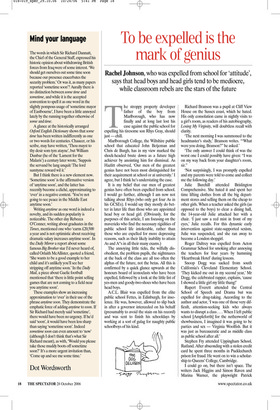Mind your language
The words in which Sir Richard Dannatt, the Chief of the General Staff, expressed his historic opinion about withdrawing British forces from Iraq were of some interest. ‘We should get ourselves out some time soon because our presence exacerbates the security problem.’ Or was it, as many papers reported ‘sometime soon’? Aurally there is no distinction between some time and sometime, and while it is the accepted convention to spell it as one word in the slightly pompous usage of ‘sometime mayor of Eastbourne’, I have been a little annoyed lately by the running together otherwise of some and time.
A glance at the historically arranged Oxford English Dictionary shows that some time has been written indifferently as one or two words for centuries. Chaucer, or his scribe, may have written, ‘Thou mayst to thy desir som tym atayne’, but William Dunbar (he of the ‘Lament for the Malaris’) a century later wrote, ‘Suppois the servand be lang unquit/ The lord sumtyme reward wil it.’ But I think there is a new element now. ‘Sometime soon’ is the affirmative version of ‘anytime soon’, and the latter has recently become a cliché, approximating to ‘ever’ in a negative context. ‘You’re not going to see peace in the Middle East anytime soon.’ Writing anytime as one word is indeed a novelty, and its sudden popularity is noticeable. The other day Rebecca O’Conner, writing about graduates in the Times, mentioned one who ‘earns £20,500 a year and is not optimistic about receiving dramatic salary increases anytime soon’. In the Daily Mirror a report about some famous Big Brother star I’d never heard of, called Orlaith McAllister, quoted a friend, ‘She wants to be a good example to her child and it’s unlikely you’ll see her stripping off anytime soon.’ In the Daily Mail, a piece about Gaelic football mentioned that ‘there is little point selling games that are not coming to a field near you anytime soon’.
These examples show an increasing approximation to ‘ever’ in their use of the phrase anytime soon. They demonstrate the emphatic force of adding anytime to soon. If Sir Richard had merely said ‘sometime’, there would have been no urgency. If he’d said ‘soon’, it would have been less sharp than saying ‘sometime soon’. Indeed sometime soon can even amount to ‘now’ (although I don’t think that’s what Sir Richard meant), as with, ‘Would you please take those muddy boots off sometime soon?’ It’s a more urgent invitation than, ‘Come up and see me some time.’
Dot Wordsworth


























































































 Previous page
Previous page